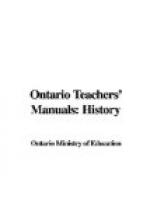EGERTON RYERSON
One of the objects of instruction in civics is to create in the pupils ideals of citizenship that may influence their conduct in after life. The most powerful agency to use for this object is the life of some useful and patriotic citizen who gave his talents and energy to the bettering of his country. In using biography for this purpose the pupils should be given only such facts as they can comprehend, and these facts should be made as real, vivid, and interesting as possible by appropriate personal details and concrete description. The following sketch may serve as an example:
Dr. Ryerson, in speaking of his birth and parentage, said:
I was born on March 24th, 1803, in the township of Charlotteville, near the village of Vittoria, in the then London district, now the County of Norfolk. My father had been an officer in the British army during the American Revolution, being a volunteer in the Prince of Wales’ Regiment of New Jersey, of which place he was a native. His forefathers were from Holland, and his more remote ancestors were from Denmark. At the close of the American revolutionary war, he, with many others of the same class, went to New Brunswick, where he married my mother, whose maiden name was Stickney, a descendant of one of the early Massachusetts Puritan settlers. Near the close of the last century, my father with his family followed an elder brother to Canada, where he drew some 2,500 acres of land from the Government for his services in the army, besides his pension.
Ryerson’s mother had a very strong influence over him. She was a very religious woman with a great love for her children, and from her Egerton learned lessons that never ceased to influence him. After telling how she treated him when he had done something naughty, he says that “though thoughtless and full of playful mischief, I never afterwards knowingly grieved my mother, or gave her other than respectful and kind words.”




